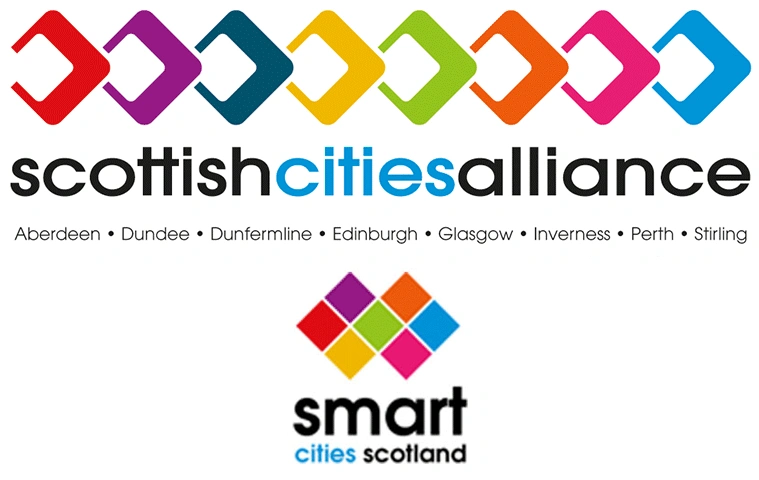City authorities across Scotland have taken the lead in setting targets to reduce city emissions, some with ambitious deadlines ahead of Scotland’s national net zero target. These targets go beyond participating city authorities’ organisational footprints to tackle all territorial emissions within the local authority boundary.
The Carbon Scenario Tool Pathfinder project began as a partnership between the City of Edinburgh Council (CEC) and Edinburgh Climate Change Institute (ECCI) to consider how to support decision-making for climate action which led to the partnership with Scottish Cities Alliance (SCA) to explore the potential to support wider capability and capacity building for net zero targets across city authorities. The project has been funded by the Scottish Government, with the aim of supporting integration of area-wide action with Local Heat and Energy Efficiency Strategies (LHEES).
The project team engaged local authority staff from the seven city authorities and other key stakeholders through a series of workshops and one-to-one interviews and evaluated tools, data and other evidence.
The project lead from ECCI, Clare Wharmby, said: “The scope and ambition of the targets set represents a huge change in both the size and complexity of the problem and the requirement for partnership working with the organisations and individuals who control these emissions.
This in turn requires a coordination and stimulation role by cities, who need effective data and tools to evidence and enable this decision-making, and also the skills and resources to implement action at a pace consistent with deliver of local and national net zero targets.”
Key Findings
Several key areas were identified that are currently holding back delivery of net zero action:
- Varying use of tools: several solutions are available for area-wide emissions and the decision about which tool to use is made individually by each Local Authority, whereas there are significant advantages in taking a more consistent approach across Scotland. This project has produced a set of Local Authority core functional requirements for such a tool.
- Struggles with data: data is used inconsistently between geographies and multiple datasets require officers to spend too much time gathering and preparing data when value should come from analysing and presenting data to inform decisions.
- Inconsistent accounting: a lack of consistency on everything from terminology, boundaries and approaches currently impedes collective understanding and shared progress.
- Constraints in capacity and capability: limited resources and gaps in data analysis skills are creating bottlenecks in assessing the impact of actions taken to inform future strategy and delivering climate action.
The project has produced a set of recommendations for Scottish Government, local authorities, supporting organisations such as ECCI, SSN and the Improvement Service, and the wider public and private sector. These include:
- Publishing an annual area-wide GHG emissions dataset with an appropriate boundary, ensuring consistency with local authorities’ Local Heat and Energy Efficiency Strategies.
- Investigating the opportunity to buy a licence for the existing area-wide tool which has the best match with local authority requirements
- Supporting the development of both capacity and capability within Local Authorities by acknowledging the responsibility of all sectors in supporting the delivery of net zero targets and creating systems to share knowledge and expertise.
“The Carbon Scenario Tool Pathfinder has taken an important step forward in establishing the actions needed to enable consistent and effective coordination and delivery of area-wide net zero targets. It has also placed in the wider context of net zero planning, the key role that Local Heat and Energy Efficiency Strategies will play in setting out the long-term plan for decarbonising heat in buildings and improving their energy efficiency across an entire local authority area.”
Ragne Low, Head of Heat Strategy, Scottish Government
“Newly-elected councils across the length and breadth of Scotland face the huge challenge of delivering fair and resilient climate action for all. Get it right, and our cities and local authorities can be a powerful force for change; one that brings stretching climate targets within reach and that realises a truly just transition at national and local scales. The Carbon Scenario Tool Pathfinder project is an exemplar of how cities and local authorities can and must be better informed in the climate choices they all now have to make.”
Professor Dave Reay, Director of Edinburgh Climate Change Institute
Following the publication of this report and widespread agreement by stakeholders, the next stage will be to develop a detailed implementation plan with partners.
Notes to editors:
Participating Local Authorities
- Aberdeen City Council
- City of Edinburgh Council
- Dundee City Council
- Glasgow City Council
- Highlands Council
- Perth and Kinross Council
- Stirling Council
Edinburgh Climate Change Institute
The Edinburgh Climate Change Institute was established in 2010 and is a leading interdisciplinary hub within the University of Edinburgh, driving evidence based climate action across Scotland, the UK and beyond. The climate change challenge is an environmental, social and economic priority, and therefore our focus is identifying the most effective ways to accelerate action towards a thriving and sustainable Scotland.
ECCI is a centre of excellence within the School of GeoSciences, University of Edinburgh. The centre is an inclusive hub for researchers, policy makers, businesses, students and educators. As such the ECCI community includes agencies who work to tackle climate change and experienced climate practitioners working on externally funded challenge driven projects. Our community also includes students studying climate change and those that teach them. ECCI led projects are primarily funded through research and government grants, public and private sector support, and through expert consultancy. We seek to work with a diverse range of agents for change focussed on climate solutions.
Scottish Cities Alliance
The Scottish Cities Alliance is the unique collaboration of Scotland’s seven cities – Aberdeen, Dundee, Edinburgh, Glasgow, Inverness, Perth and Stirling – and the Scottish Government working together to promote the country’s great economic potential.
https://scottishcities.wpengine.com/

